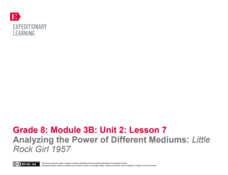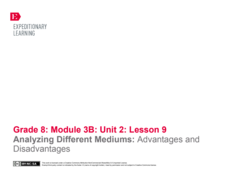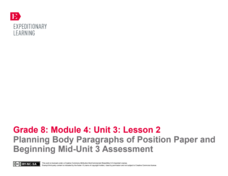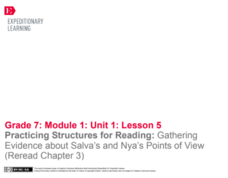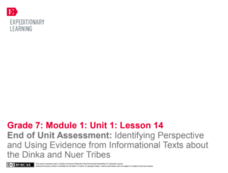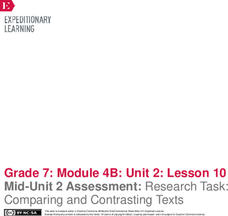EngageNY
Analyzing How Shakespeare’s Play Draws upon Greek Mythology: Part 2
Pupils explore the narrative structure of a piece of literary text, mapping out the plot structure of the Greek myth "Pyramus and Thisbe." Next, they use their completed graphic organizers to write story summaries.
National Woman's History Museum
Susan B. Anthony: She's Worth a Mint!
A instructional activity all about Susan B. Anthony showcases the Civil Rights leader's contributions towards equality. A Susan B. Anthony coin sparks engagement. Scholars take part in a discussion that sheds light on what being an agent...
EngageNY
Building Background Knowledge: The Internment of Japanese-Americans during WWII, Part 1
It is all in the details. Scholars read The Life of Miné Okubo and pay special attention to details that reveal Okubo's character. Completing their Understanding Miné: Character Traits graphic organizers and recalling the descriptions...
EngageNY
Analyzing a Thematic Concept: Becoming Visible after Captivity
Have some dignity. Readers describe the word dignity using a word web and then sort Louie's actions into categories of reconnecting or dignity with a Visibility Double Arrow graphic organizer. They then use all of their ideas and...
National Woman's History Museum
Tea with Penelope: A 2-Point Perspective of the Edenton Tea Party
A brief introduction to Penelope Barker sets the stage for a discussion about political cartoons and the persuasive technique used to create them. A graphic organizer aids scholars in the analysis of a piece of work using a 2-point...
EngageNY
Advantages and Disadvantages of Various Mediums: The Montgomery Bus Boycott Speech
Text, speech, phone call. Scholars discuss the advantages and disadvantages of using speech and written text to express ideas. They use an Analyzing Mediums graphic organizer to analyze speeches by Martin Luther King Jr. They then...
EngageNY
Analyzing the Power of Different Mediums: Little Rock Girl 1957
Scholars begin the instructional activity by watching a video of media history and discussing it in a Turn and Talk. They then look at the texts A Mighty Long Way and Little Rock Girl 1957 to make a connection to the role of the press in...
EngageNY
Analyzing Different Mediums: Advantages and Disadvantages
How do authors play to people's moods? After briefly reviewing mood using a Conditional and Subjunctive Mood handout, learners practice identifying conditional and subjunctive sentences in the Montgomery Bus Boycott speech before reading...
Radford University
Translating and Evaluating Cell Phone Plans
Translate phone plans to algebraic expressions. Pupils review translating verbal phrases to algebraic expressions by filling out graphic organizers and completing matching activities. Using a fictitious cell phone company, they create...
EngageNY
Planning Body Paragraphs of Position Paper and Beginning Mid-Unit 3 Assessment
The best sandwiches aren't always edible. Pupils use a Quote Sandwich graphic organizer to plan paragraphs two and three of their position papers about the best food chain. Next, they begin drafting their body paragraphs for the mid-unit...
EngageNY
Practicing Structures for Reading: Gathering and Using Evidence to Analyze Salva’s and Nya’s Points of View (Chapter 4)
Class members discuss the gist of chapter four of A Long Walk to Water by Linda Sue Park with a partner and share their responses with the class. Next, they complete graphic organizers to answer text-dependent questions based on a close...
EngageNY
Practicing Structures for Reading: Gathering Evidence about Salva’s and Nya’s Points of View (Reread Chapter 3)
How does an author develop and contrast character points of view in a work of literature? Using a graphic organizer, readers continue gathering evidence about character point of view from Linda Sue Park's A Long Walk to Water. Next,...
EngageNY
Mid-Unit Assessment: Gathering and Using Evidence to Analyze Points of View in A Long Walk to Water (Chapter 5)
Class members discuss how culture, place, and time influence a character's identity in A Long Walk to Water by Linda Sue Park. Then, as part of a mid-unit assessment, they complete a Gathering Evidence graphic organizer to answer the...
EngageNY
Building Background Knowledge: The Dinka and Nuer Tribes
Building on a previous lesson plan, readers continue using context clues to learn new vocabulary. Additionally, they continue working on their Gathering Evidence graphic organizers, making connections between an informational text and A...
EngageNY
End of Unit Assessment: Identifying Perspective and Using Evidence from Informational Texts about the Dinka and Nuer Tribes
Pupils consider the varying perspectives of people in different cultural groups as they read an informational text about the Dinka tribe of Southern Sudan and complete graphic organizers. They also respond to a constructed-response...
EngageNY
Scaffolding to Essay: Using Details to Support a Claim
Show me the evidence. Writers analyze the Command of Evidence row of the rubric for A Long Walk to Water essay. Pupils work in pairs to determine how the writer of a model essay meets the demands of the rubric. They then use a Forming...
EngageNY
Forming Evidence-Based Claims: Should Lyddie Sign the Petition?
Pupils reread selected passages from Katherine Paterson's novel Lyddie. After they finish, individuals gather textual evidence supporting whether Lyddie should sign a controversial petition and record their findings on graphic organizers.
EngageNY
Reading Closely: Introducing Chávez’s Commonwealth Club Address and Considering the Plight of the Farmworker
How can a persuasive speech help inspire social change? Scholars read along as they listen to the first half of César Chávez's 1984 speech, "Commonwealth Club Address." Next, pupils use graphic organizers to analyze one of Chávez's...
EngageNY
Speech Structure: Unions as Agents of Change— Part 2
Scholars continue reading César Chávez's 1984 speech, "Address to the Commonwealth Club of California." Working with partners, they complete graphic organizers to determine a claim that Chávez makes about the UFW.
Teaching Tolerance
Why Do We (Still) Celebrate Columbus Day?
What are we really celebrating on Columbus Day? The resource explores the narrative behind Columbus Day and ways for people to change the perception. Scholars also review vocabulary terms associated with the topic and how attitudes have...
EngageNY
Choosing a Position: Screen Time and Adolescents
Time to pick a side! Building on the Fishbowl activity from the previous instructional activity, scholars choose a position about whether the American Academy of Pediatrics should raise its screen time recommendations. Using notes,...
EngageNY
Forming a Research-Based Claim: Analyzing Risks and Benefits for Stakeholder
Welcome to the World Café, where lively debate is on the menu! Scholars participate in the World Café protocol, moving between discussion groups to decide if the American Academy of Pediatrics should increase its adolescent screen time...
McGraw Hill
Study Guide for Frankenstein
Help the class uncover the story of Frankenstein. Learners answer questions and complete activities to respond to the text Frankenstein as they read. Scholars learn new vocabulary, respond to personal and text-dependent questions,...
EngageNY
Mid-Unit 2 Assessment: Research Task: Comparing and Contrasting Texts
It's the half-way mark! Pupils demonstrate understanding of unit standards by completing a mid-unit assessment. After reading an informational article about water management strategies, scholars complete a graphic organizer to identify...
Other popular searches
- Main Idea Graphic Organizers
- Science Graphic Organizers
- Math Graphic Organizers
- Sample Graphic Organizers
- Writing Graphic Organizers
- Graphic Organizers for Math
- Math and Graphic Organizers
- Using Graphic Organizers
- Graphic Organizers Rating=3
- Graphic Organizers for Reading
- Pre Writing Graphic Organizers
- Vocabulary Graphic Organizers








